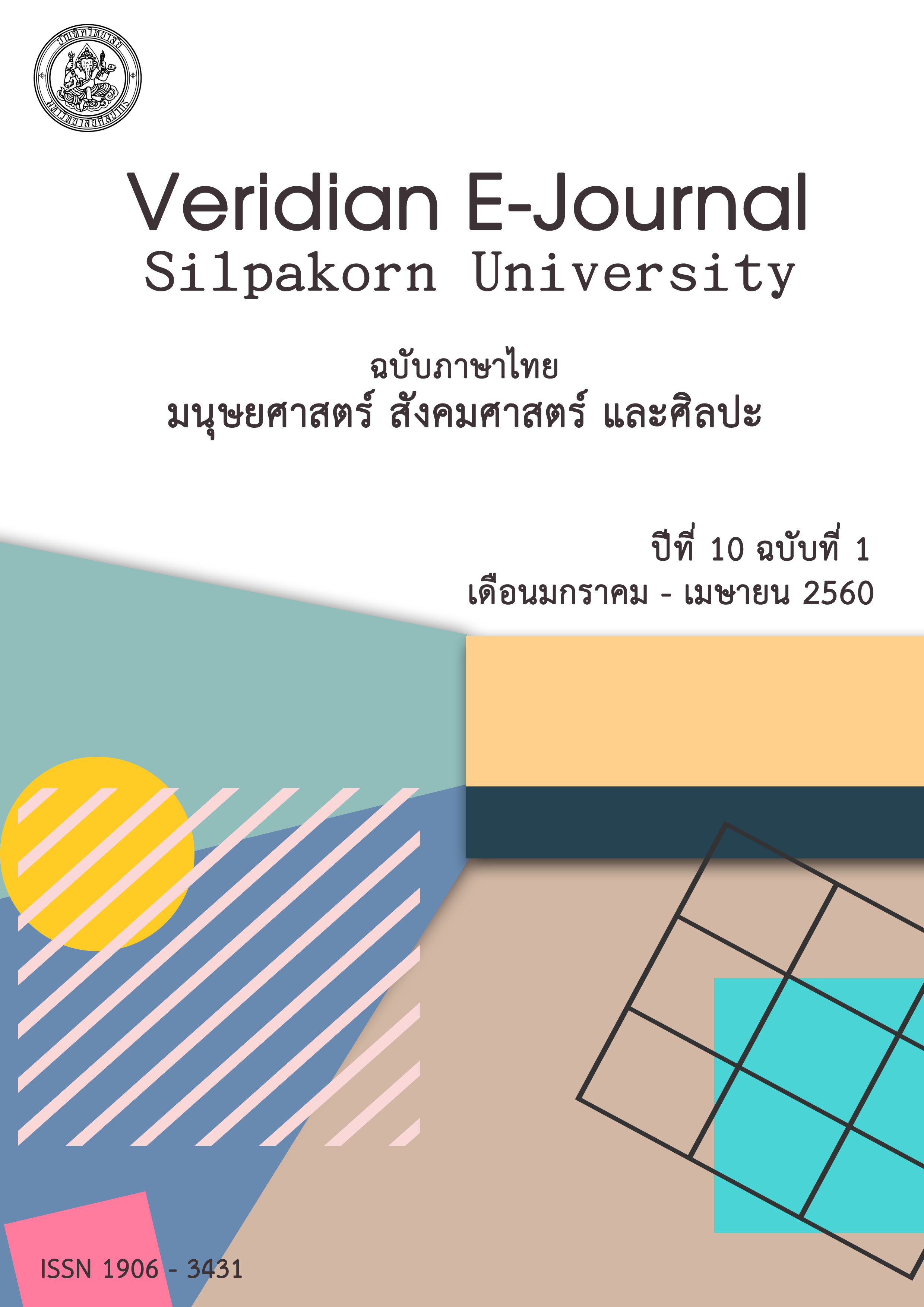การศึกษาปัจจัยที่มีอิทธิพลต่อพฤติกรรมการเรียนรู้ผ่านมุมมองเชิงภูมิศาสตร์ กรณีศึกษา นิสิตสาขาวิชาสังคมศึกษา คณะครุศาสตร์ มหาวิทยาลัยราชภัฏบ้านสมเด็จเจ้าพระยา
Main Article Content
Abstract
การวิจัยนี้มีวัตถุประสงค์ 1) เพื่อศึกษาระดับของปัจจัยที่มีอิทธิพลต่อพฤติกรรมการเรียนรู้ของนิสิตสาขาวิชาสังคมศึกษา คณะครุศาสตร์ มหาวิทยาลัยราชภัฏบ้านสมเด็จเจ้าพระยา และ 2) เพื่อศึกษา แนวทางการจัดการเรียนรู้ที่เหมาะสมให้กับนิสิตสาขาวิชาสังคมศึกษา คณะครุศาสตร์ มหาวิทยาลัยราชภัฏบ้านสมเด็จเจ้าพระยา การวิจัยครั้งนี้เป็นการวิจัยแบบผสม (Mixed Method) ส่วนแรกใช้วิธีการเชิงปริมาณที่ใช้แบบสอบถามเป็นเครื่องมือในการเก็บข้อมูลจากกลุ่มตัวอย่างนิสิตชั้นปีที่ 1 – 4 จำนวน 200 คน และส่วนที่สองใช้วิธีการเชิงคุณภาพด้วยการสัมภาษณ์เชิงลึก จัดสนทนากลุ่ม จากผู้ให้ข้อมูลหลัก ได้แก่ นิสิตสาขาวิชาสังคมศึกษา อาจารย์ผู้สอน และผู้ที่เกี่ยวข้องกับการบริหารการศึกษา การวิจัยนี้ใช้เทคนิคการพรรณนาเชิงวิเคราะห์ โดยอาศัยแนวคิดทางภูมิศาสตร์ สังคมศาสตร์ และแนวคิดทางการศึกษา เพื่อเป็นกุญแจสำคัญในการหาคำตอบ
ผลการวิจัยพบว่า ระดับของปัจจัยภายนอกมีอิทธิพลต่อพฤติกรรมการเรียนรู้ของนิสิตสูงกว่าระดับของปัจจัยภายใน (ปัจจัยภายนอกมีค่าเฉลี่ยรวม 3.91 , ปัจจัยภายในที่มีค่าเฉลี่ยรวม 3.71) เมื่อพิจารณาระดับของปัจจัยภายนอกเป็นรายด้าน พบว่า ด้านครอบครัวมีอิทธิพลต่อพฤติกรรมการเรียนรู้ของนิสิตมีค่าเฉลี่ยสูงที่สุด ( ̅x= 4.32) รองลงมาคือด้านบุคคลที่มีอิทธิพลต่อนิสิต ( ̅x = 3.88) ด้านการเรียนการสอน ( ̅x= 3.81) และด้านภูมิศาสตร์และสภาพแวดล้อม ( ̅x= 3.63) ตามลำดับ และเมื่อพิจารณาระดับของปัจจัยภายในเป็นรายด้านพบว่า ด้านความคิดและความคาดหวังต่อการเรียนมีค่าเฉลี่ยสูงที่สุด ( ̅x = 3.97) รองลงมาคือ ด้านสภาพทั่วไปของนิสิตเกี่ยวกับการเรียน ( ̅x= 3.73) และด้านพฤติกรรมการเรียนของนิสิต ( ̅x= 3.42) ตามลำดับ ดังนั้นปัจจัยภายนอกจึงเป็นตัวกำหนดปัจจัยภายในอีกต่อหนึ่ง ผลการวิจัยเผยให้เห็นว่าปัจจัยภายนอกด้านครอบครัวมีความสัมพันธ์ที่ต่อเนื่องกันกับปัจจัยภายในด้านความคิดและความคาดหวังต่อการเรียน รวมถึงด้านอื่นๆ ตามมา ซึ่งนำไปสู่พฤติกรรมการเรียนรู้ของนิสิตที่แตกต่างกัน สาเหตุที่ปัจจัยภายนอกด้านครอบครัวมีอิทธิพลต่อพฤติกรรมการเรียนรู้ของนิสิตมากที่สุดเนื่องจาก ปัจจัยภายนอกมีองค์ประกอบที่ทำให้นิสิตสามารถดำเนินการเรียนได้อย่างปกติ ได้แก่ การที่ครอบครัวเข้าใจในตัวนิสิต การเปิดโอกาสให้นิสิตเรียนรู้ตามความสนใจ และความพร้อมในการสนับสนุนการเรียนของนิสิตไม่ว่าจะเป็นด้านค่าใช้จ่ายในการเรียน ค่าเทอม ค่ากิจกรรม ตลอดจนค่าการใช้ชีวิตระหว่างเรียน ดังนั้นปัจจัยภายนอกด้านครอบครัวจึงมีความสำคัญอย่างมาก ที่ส่งผลต่อพฤติกรรมการเรียนรู้ของนิสิตไม่ทางใดก็ทางหนึ่ง
ส่วนแนวทางการจัดการเรียนรู้ที่เหมาะสมให้กับนิสิตสาขาวิชาสังคมศึกษา คณะครุศาสตร์ มหาวิทยาลัยราชภัฏบ้านสมเด็จเจ้าพระยา พบว่า ควรมีการจัดการเรียนรู้ให้สอดคล้องกับเวลาและสถานที่ อันอยู่ภายใต้ความสัมพันธ์เชิงอำนาจ พื้นที่แห่งการเรียนรู้ต้องอยู่ในสภาวะที่ไม่กดดัน มีบรรยากาศที่ผ่อนคลาย (เหมือนกับบ้าน: คุ้นชิน ผูกพัน) และต้องมีการสร้างพื้นที่การเรียนรู้ให้เกิดเป็นสังคมแห่งการเรียนรู้ โดยเริ่มจากการผลิตสร้างความหมายให้กับพื้นที่ (Production of Space) ใน 3 ลักษณะคือ 1) การสร้างภาพตัวแทนของพื้นที่ (Representations of Space) โดยสร้างวาทกรรมผ่านสัญญะให้เกิดเป็นพื้นที่แห่งการเรียนรู้2) ใช้ปฏิบัติการทางพื้นที่ (Spatial Practice) โดยนำเอาพื้นที่มโนทัศน์ของภาพตัวแทนที่เชื่อมโยงกับพื้นที่เชิงการรับรู้ พื้นที่ความคิด พร้อมทั้งสร้าง ภูมิทัศน์ให้เอื้อต่อการเรียนรู้ (พื้นที่สามารถกำหนดพฤติกรรมการเรียนรู้ได้) และ 3) เมื่อภาพตัวแทนของพื้นที่ผสานร่วมกันกับปฏิบัติการทางพื้นที่จะนำไปสู่พื้นที่ที่เป็นตัวแทน (Representational Space) เกิดเป็นพลังขับเคลื่อนสร้างสังคมแห่งการเรียนรู้ขึ้นมาได้ อีกทั้งพฤติกรรมการเรียนรู้ของนิสิตยังมีความเกี่ยวข้องกับกระบวนการแปรเปลี่ยนพื้นที่ให้กลายเป็นถิ่นที่ ขอบเขตการเรียนรู้ถูกขยายออกไปเรื่อยๆ เปรียบเสมือนกงล้อการเรียนรู้ที่กำลังหมุนเคลื่อนตัวไปข้างหน้าพร้อมทั้งเพิ่มพูนความรู้ ประสบการณ์ และสะสมความผูกพันเกิดเป็นพฤติกรรมการเรียนรู้ในแบบฉบับของนิสิตสาขาวิชาสังคมศึกษาที่มีลักษณะเฉพาะตัว ดังนั้นทิศทางพฤติกรรมการเรียนรู้ของนิสิตจึงขึ้นอยู่กับการประสานงานของแต่ละปัจจัยอย่างแนบสนิทไม่ว่าจะเป็น พื้นที่การเรียนรู้ รูปแบบการจัดการเรียนรู้ และการสนับสนุนจากครอบครัว เป็นสำคัญ
This research aims: (1) to study the level of factors affecting the learning behaviour of the students of the social study program, the Faculty of Education, Bansomdejchaopraya Rajabhat University; and (2) to formulate a guideline for organizing learning activities that suit these students the most. The research employs the mixed method; namely, the first part uses the quantitative method involving the use of questionnaires for collecting the data from the sample groups of 200 first to fourth year students while the second part uses the qualitative method involving indepth interviews, as well as group discussion, with the principal informants, i.e. the social studies students, lecturers, and others concerned with educational administration. This research employs descriptive analytics which involves the application of geographical, social scientific, as well as educational, concepts as key to solution.
The research reveals that the level of external factors have more effect on the students’ learning behaviour than the level of internal ones (the former yields the combined mean value of 3.91 while the latter 3.71). The aspect by aspect consideration of the level of external factors reveals that family factors have the most effect on the students’ learning behaviour ( ̅x= 4.32), followed by personal factors ( ̅x= 3.88), then learning and teaching factors (= 3.81), and lastly the geographical and environmental factors ( ̅x= 3.63). The aspect by aspect consideration of the level of internal factors reveals that students’ views and expectations on learning have the highest average ( ̅x= 3.97), followed by the students’ learning condition ( ̅x= 3.73), and lastly the students’ behavior ( ̅x= 3.42). Therefore, the external factors determine the internal ones. In addition, the research demonstrates that the family factors have a continuous relations to the students’ views and and expectations on the learning and other aspects enumerated above, resulting in the students’ different learning behaviors. The family factors affect the students’ learning behaviors the most due since the external factors comprise many components, namely, perceptive family, freedom to choose what to learn according to their interests, and their financial supports such as tuition fees, activity fees, and personal allowances. Therefore, the family factors are the most influential in determining the students’ learning behaviors in one way or another.
The guideline recommended for organizing learning activities that suit the social studies students, are: these activities have to be organized relative to specificity of the power relation in different places and occasions; the learning space has to be free from pressures and has relaxing atmosphere (like home: familiarity and bondage); and this learning space has to be developed into learning society. The implementation of this shall begin with the production of space, which comprises three aspects: (1) Representations of space, which involves producing discourses through symbols into learning space; (2) Spatial practice, which involves the use of the conceptual space produced by the above – mentioned representations in connection with perceptual space, thinking space, as well as the creation of learning – friendly landscape (space can determine learning); (3) the combination of the representations of space and the spatial practice brings about the potential to create learning society. In addition, the students’ learning behaviour is also related to the transformation of space into place. The students’ scope of learning is more and more extended like the wheel of learning that moves forward with the ever – increasing knowledge, experience and bondage, which will bring about the learning behaviour unique to the social studies students. Therefore, the direction for the students’ learning behaviors depends upon the seamless coordination of all the factors such as learning space, forms of learning organization, and the support from the family.
